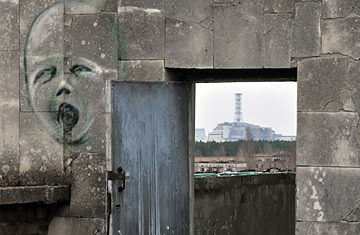
Graffiti marks a wall in the ghost city of Pripyat near Chernobyl's reactor No. 4, in Ukraine
(2 of 2)
Around the 25-year-old disaster site, prefabricated buildings have been put in place, equipped with air-conditioning and officially isolated from the radiation. Daily life is not easy, although according to Alexandre, one of the Ukrainian experts employed by Vinci, this job is a true adventure. "I certainly hope I will see it through to the end," he says. Not all of the workers, however, share Alexandre's enthusiasm.
Every morning, along with their bosses, the workers arrive at the Chernobyl train station. Most arrive from Slavutich, a bedroom community that Soviet authorities built after the disaster in a location protected from the prevailing winds. Safety scans, used to detect any abnormal radioactivity levels, are placed right at the entry of the station platforms. Latecomers who may have drunk a bit too much the night before — there are usually a couple — arrive on the 11:15 a.m. shuttle, which people there call "the merrymakers' train."
The long commute is not the only factor Regnault has to take into account in recruiting his employees. "Sometimes very experienced and skilled people fail the medical examination and are thus denied access to the site. Younger people, on the other hand, tend to be in good health, but very often they've never held a hammer in their life and we have to train them," he says. Only the promise of a decent salary — a minimum of $360 per month with bonuses that can reach 24% — attracts new recruits.
On the train that transports them back to a safer place each night, the Novarka workers travel with many of the 3,000 people still employed by the Chernobyl nuclear plant. Most do maintenance work. "The radioactivity is certainly scary, but here my salary [$650 per month] is three times what I'd make in my home town. It's enough to support my family," says a man named Vladimir, who has been working at the plant for 17 years.
Unlike the people promoting the Novarka project, Vladimir thinks the shield will result in a slow social death for Chernobyl. "The plant might close sooner than expected, and there will be less work for us." Vladimir cares little about the technical wizardry of the Western engineers. He is still attached to his little radioactive cocoon.
Also from Worldcrunch:
Is Ireland A Model For How The West Can Recover?
— Die Welt
And Where Does Lebanon Stand on Syria?
— Le Monde
Counterfeit Wine in China: Can You Smell That Fake Bordeaux?
— Le Figaro
